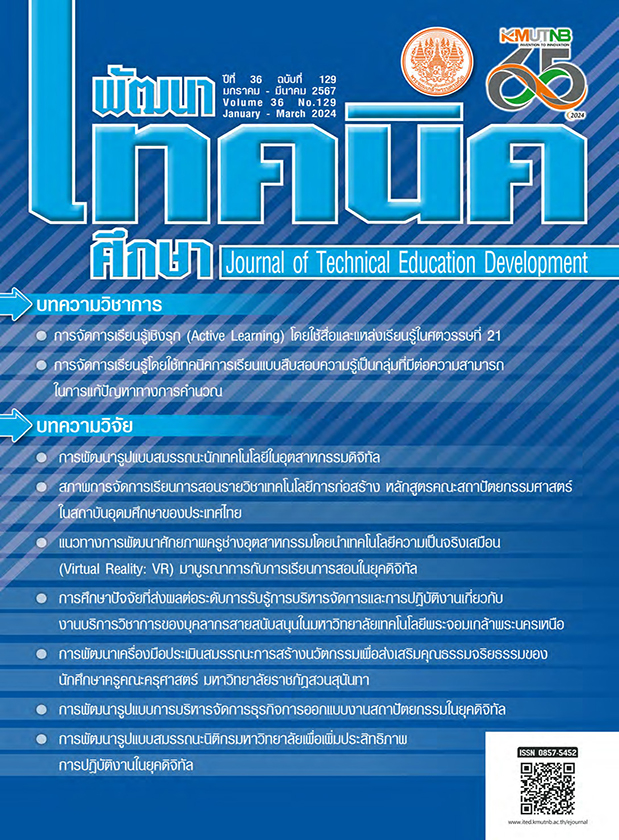The Development of Innovation Competency in Promoting the Morality and Ethics of Student Teachers, Faculty of Education, Suan Sunandha Rajabhat University
Main Article Content
Abstract
The objective of this research is to create and monitor the quality of the innovation competency assessment tool to promote morality and ethics of student teachers. Faculty of Education, Suan Sunandha Rajabhat University The research subjects were 5 experts and 30 students from the Faculty of Education, Suan Sunan Rajabhat University. The research instruments were the Item-Objective Congruence Index (IOC) and the Innovation Competency Assessment for Moral and Ethical Promotion, which are 5-level assessment scales of 20 items. Statistics used in quality analysis include IOC values and alpha coefficient confidence values (a)
The results of the study showed: 1) The content precision value of the Innovation Competency Assessment Form to promote morality and ethics of teacher students. The IOC value is between 0.80 – 1.00, which meets all criteria, the competency assessment can be used to evaluate student’s innovation. 2) Confidence in the Innovation Competency Assessment Form to promote morality and ethics of teacher students It is a confidence check by finding the entire alpha coefficient of 0.850, which can be used by the assessment.
Article Details

This work is licensed under a Creative Commons Attribution-NonCommercial-NoDerivatives 4.0 International License.
References
สำนักงานเลขาธิการสภาการศึกษา. (2550). คุณธรรมขั้นพื้นฐาน 8 ประการ. กรุงเทพมหานคร : กระทรวงศึกษาธิการ.
คณะครุศาสตร์ มหาวิทยาลัยราชภัฏสวนสุนันทา. (2562). หลักสูตรครุศาสตรบัณฑิต (หลักสูตรปรับปรุง พ.ศ.2562). กรุงเทพมหานคร: มหาวิทยาลัยราชภัฏสวนสุนันทา.
ทิศนา แขมมณี. (2559). ศาสตร์การสอน : องค์ความรู้เพื่อการจัดกระบวนการเรียนรู้ที่มีประสิทธิภาพ. พิมพ์ครั้งที่ 20. กรุงเทพมหานคร: โรงพิมพ์แห่งจุฬาลงกรณ์มหาวิทยาลัย.
พิสณุ ฟองศรี. (2551). วิจัยชั้นเรียน: หลักการและเทคนิคปฏิบัติ. พิมพ์ครั้งที่ 6. กรุงเทพมหานคร: ด่านสุทธาการพิมพ์.
วรรณี แกมเกตุ. (2555). วิธีวิทยาการวิจัยทางพฤติกรรมศาสตร์. พิมพ์ครั้งที่ 3. กรุงเทพมหานคร: โรงพิมพ์แห่งจุฬาลงกรณ์มหาวิทยาลัย, 2555.
พิชิต ฤทธิ์จรูญ. (2556). หลักการวัดและประเมินผลการศึกษา. พิมพ์ครั้งที่ 8. กรุงเทพมหานคร: เฮ้าส์ ออฟ เคอร์มิสท์.
บุญชม ศรีสะอาด. (2556). การวิจัยเบื้องต้น ฉบับปรับปรุงใหม่. พิมพ์ครั้งที่ 9. กรุงเทพมหานคร: สุวีริยาสาส์น.
McClelland, D.C. (1973). Testing for Competency Rather than Intelligence. American Psychologist. 17 (7): 57-83.
Ledford, E.Gerald. & Heneman, L. Robert. (June, 1998). Competency Pay for Professionals and Managers in Business: A review and Implications for Teacher. Journal of Personal Evaluation in Education. 12 (2): 103-121.
ไพศาล วรคำ. (2559). การวิจัยทางการศึกษา. พิมพ์ครั้งที่ 8. มหาสารคาม: ตักศิลาการพิมพ์.
11 ยุทธ ไกยวรรณ์. (2550). การสร้างเครื่องมือวิจัย. กรุงเทพมหานคร : พิมพ์ดี.


